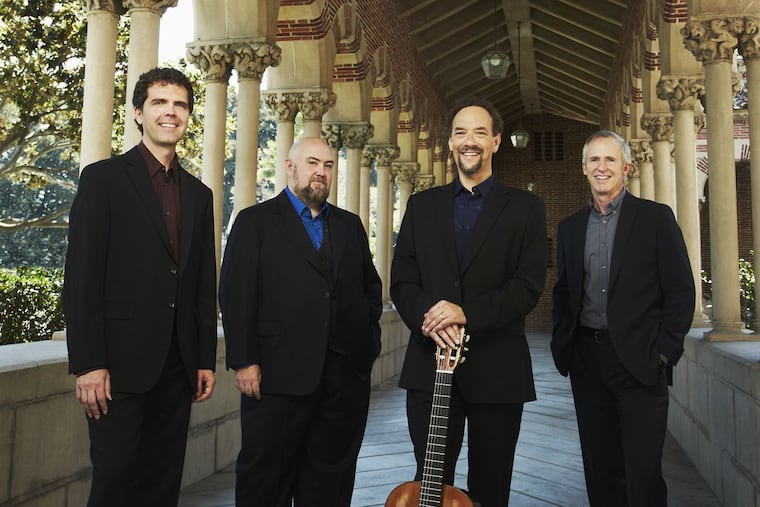Easy on the ears: Los Angeles Guitar Quartet joins Philadelphia Orchestra and Cristian Macelaru
A warm glow accompanied the program. There's reason to expect more interpretive daring later in the run.

Nearly every orchestra grapples with how much to lead public taste and how much to follow. Thursday night in Verizon Hall, the Philadelphia Orchestra was a follower.
All four works on the current program are encountered regularly by anyone who spends time with classical radio. One piece, Chabrier’s España, is a brief bubble of joy, and the next a Rodrigo concerto wrought of straightforward happiness and soulful solitude.
The two other pieces — by Falla and Ravel — have emotional lives that are more varied and nuanced. But in the end, this isn’t a program with any serious level of challenge or provocation. It doesn’t ask a lot of the listener.
It does give, however. And collectively over two hours, the program leaves behind a kind of warm glow. Anticipating popular appeal is a tricky business. The hall was far from full, as has been the case many a Thursday night this season.
Cristian Macelaru conducted and did so well, but the repertoire was the kind you would have expected from Charles Dutoit (who, in fact, has recorded much of it and might have brought more of a point of view to this kind of program with this orchestra before allegations of sexual misconduct severed his Philadelphia connection).
Macelaru, the orchestra’s former conductor-in-residence, led Manuel de Falla’s El amor brujo in a suite of excerpts constructed by Rafael Frühbeck de Burgos, the late conductor with whom this orchestra had a special relationship. The winds were on their mettle, especially sturdy oboist Peter Smith and sinewy English hornist Elizabeth Starr Masoudnia.
This particular suite of the Falla did not include a mezzo-soprano, and doing so would have added some edge. It also could have reminded audiences of a bit of the orchestra’s history with this piece.
When Stokowski invited Shirley Verrett in the late 1950s to sing Schoenberg’s Gurrelieder with the Houston Symphony, that orchestra’s board refused to allow the African American singer to appear. Stokowski instead brought her to Philadelphia in the Falla, which produced her fiery 1960 recording of the piece with Stokowski and the Philadelphians.
As it was Thursday night, the solo spotlight was split four ways in Rodrigo’s Concierto andaluz, a work the orchestra first programmed in 1968, just a year after its premiere by the San Antonio Symphony and guitar quartet Los Romeros. That foursome once mentored the Los Angeles Guitar Quartet, which was on hand to play the exceedingly friendly piece here.
Each of the four guitarists — John Dearman, Matthew Greif, William Kanengiser, and Scott Tennant — has a slightly different touch and sound, but each is stylish. The cadenza was lovely, and the piece was a chance to appreciate the velvet of still-new associate principal flutist Patrick Williams. You couldn’t help smile during the encore, a spirited tarantella by Chilean folk music group Inti-Illimani.
Ravel’s Rapsodie espagnole had a lot of solo highlights, including the closely bonded sound of clarinetists Ricardo Morales and Socrates Villegas. Overall, the orchestra and Macelaru gave a solid and pleasant account of the work.
Is that enough? Sometimes first-night performances give way to more interpretive daring later in the run, a progression that seemed more than likely here.
Additional performances at 8 p.m. Friday and Saturday, Verizon Hall, Broad and Spruce Streets. Tickets are $10-$153. philorch.org, 215-893-1999.